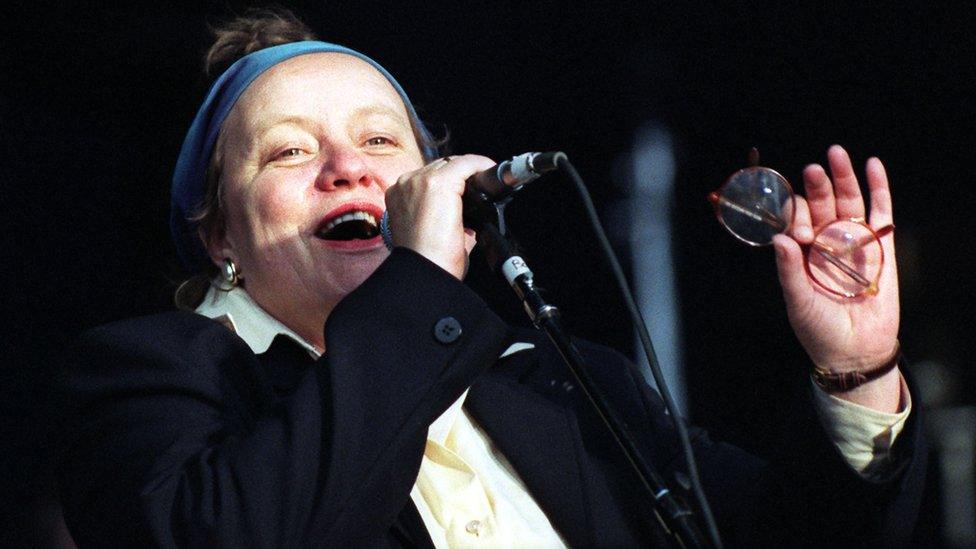Irish state papers: How Prince Andrew 'smoothed over' Lord Mandelson's gaffe
- Published

Prince Andrew was said to have a better grasp of NI affairs than Lord Mandelson, according to the papers
Prince Andrew "smoothed over" mistakes made by then Northern Ireland Secretary Peter Mandelson at a charity event in 2000, according to just-released Irish state papers.
Among the 13,200 files just released by the National Archives of Ireland are a number which chart the implementation of the Good Friday Agreement.
They also cover the Patten Report.
The task of piloting the legislation to establish a new police force fell to Mo Mowlam's replacement Mr Mandelson.
He took up the role as secretary of state for Northern Ireland in October 1999 but there were concerns about his level of interest in and knowledge of Northern Ireland.
This was noticeable at a Co-operation Ireland charity event held at the Albert Hall in London in April 2000 which was compered by Patrick Kielty, who now presents RTÉ's The Late Late Show.
Lord Mandelson, as he has been known since 2008, was "in a strange, almost detached, mood" that evening, according to the state papers.
He embarrassed David Trimble on two occasions by confusing Harland & Wolff with Shorts and asking "loudly" if Kielty's father, Jack, who was shot dead by the UFF in 1988, "had been a member of the IRA".
The "awkward silence" which ensued from that comment was resolved by a diplomatic intervention from Prince Andrew who "smoothed over the moment by remarking that there could hardly be a family in Northern Ireland that was untouched by the conflict".
The Duke of York also had a better grasp of the Harland & Wolff/Shorts situation than Lord Mandelson and "appeared more knowledgeable than the secretary of state about industrial policy on Northern Ireland", the papers said.
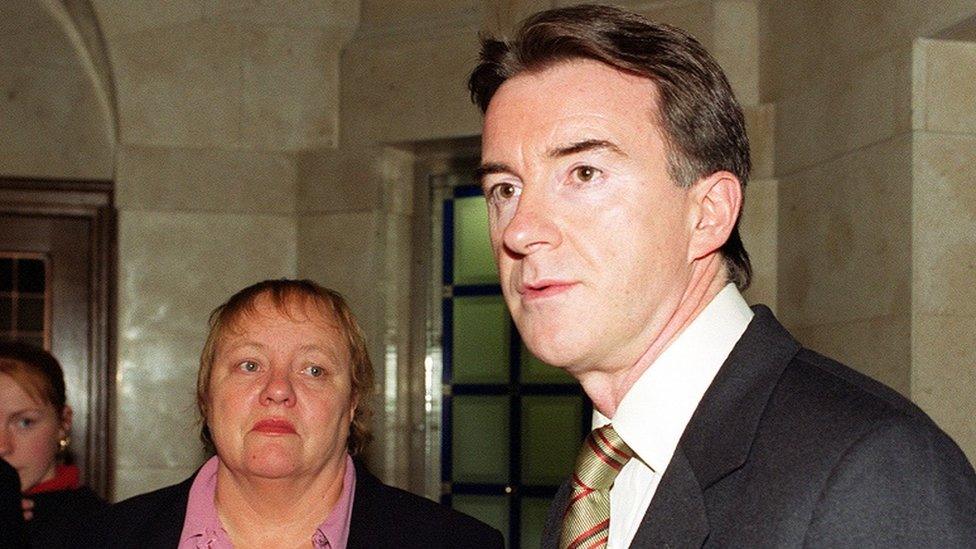
Lord Mandelson, pictured in 1999 with Mo Mowlam
When he was appointed, Irish diplomats based in London viewed Lord Mandelson as an unknown quantity on Northern Ireland.
He had made few public pronouncements on the subject and his knowledge of it was based largely on his experience of covering events in Northern Ireland while working as a journalist for London Weekend Television in the early 1980s. He was not known to have many friends or associates in the province, apart from the journalist, Mary Holland.
Where Dr Mowlam was seen as too close to nationalism, Lord Mandelson was expected to appear more neutral.
As a staunch Blairite, he was considered to "be a strong supporter of the Good Friday Agreement", though not being one of its architects, he would possibly "be willing to look at it in a more flexible way".
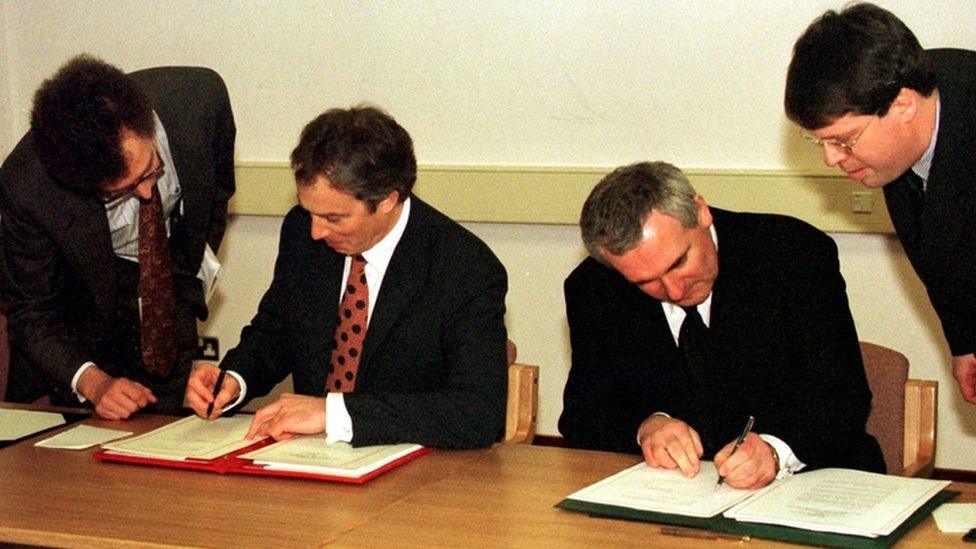
The prime minister at the time, Tony Blair, and then Taoiseach (Irish Prime Minister) Bertie Ahern sign the Good Friday Agreement
By early 2000 the Irish government was dissatisfied with the extent of Lord Mandelson's neutrality and flexibility. In particular, they were concerned that his equivocation on the name of the new police service and his initial refusal to commit to an entirely neutral new badge for the force constituted unacceptable deviations from Patten's recommendations.
Lord Mandelson resigned as secretary of state in January 2001, two months after the enactment of the Police (Northern Ireland) Act which established the Police Service of Northern Ireland (PSNI), replacing the Royal Ulster Constabulary (RUC).
Holy Cross
One of the last high-profile security incidents policed by the RUC before its replacement in November 2001 was the loyalist protest at Holy Cross girls' primary school in Ardoyne, north Belfast.
The archives contain detailed daily reports of the situation which began on 19 June, noting "conflicting reports about the cause".
Holy Cross: 'I was in the school and we heard an explosion'
Loyalists complained that a woman from their community had been prevented from accessing shops by some men, while nationalists claimed a Catholic man who had been collecting his child from school was assaulted by loyalists who were erecting paramilitary flags in the area.
The parish priest of Ardoyne, Fr Aidan Troy, identified demographic change as another contributory factor - citing a recent increase in the Catholic population of the area.
The role of loyalist paramilitaries was also significant.
Loyalists expelled from the Shankill Road during the previous year's feud had re-settled in the Glenbryn estate in Ardoyne and were "intent on stirring things up".
Fr Troy did not see the dispute as entirely one-sided and had personal experience of the intimidation complained of by loyalists living in the area.
The papers said: "He himself had been stoned by young children while out jogging because they mistook his t-shirt for a Glasgow Rangers jersey."
Early on the morning of 3 September 2001, as the school was reopening for the new school year, Fr Troy sought conciliatory talks with the local Progressive Unionist Party (PUP) MLA Billy Hutchinson.
Fr Troy was met with Mr Hutchinson's refusal to talk "to scum like you".
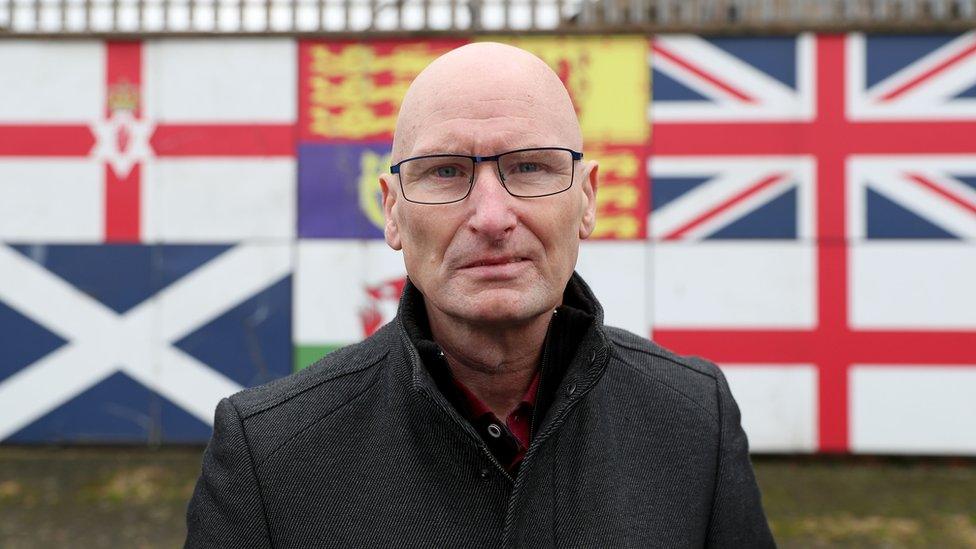
Cllr Billy Hutchinson now leads the PUP
The priest attributed the vehemence of Mr Hutchinson's language to Fr Troy's role "[a]s a priest" but declined to specify other comments uttered to him in the "tongue-lashing" he received from Mr Hutchinson.
"What he called me was unrepeatable," said Fr Troy.
The protests were eventually suspended in November 2001 following intervention by the Northern Ireland Executive with a cross-community support package providing additional resources for schools, traffic-calming, community transport, policing and a community forum.
But a brief recurrence of violence when the school re-opened in January 2002 after the Christmas holidays showed how volatile the situation remained.
The school principal Anne Tanney "bemoaned the fact that the name Holy Cross had become synonymous with bigotry and sectarian hatred, appearing alongside Drumcree in articles as a by-word for all that was wrong in their society".
Professor Marie Coleman is Professor of Twentieth Century Irish History at Queen's University Belfast
- Published10 April 2018

- Published16 February 2022
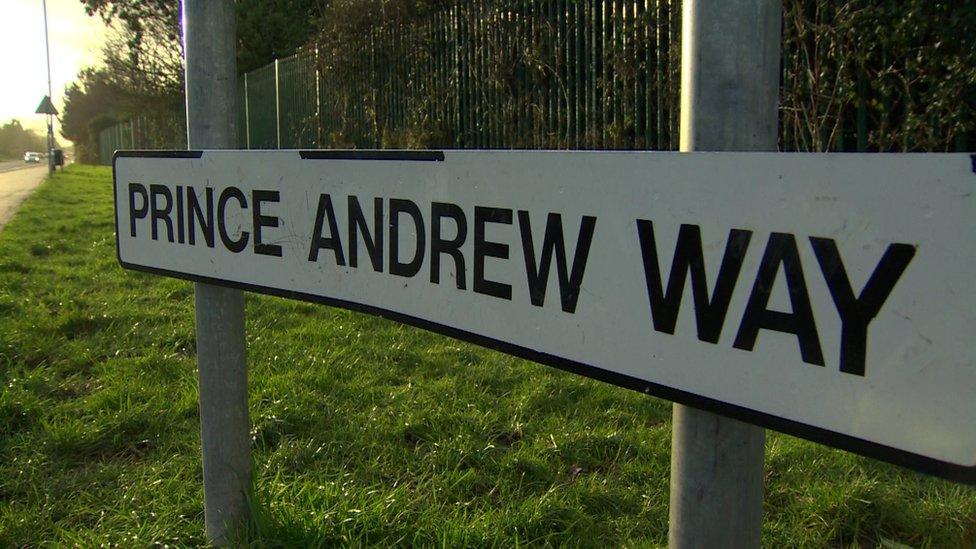
- Published29 December 2020
